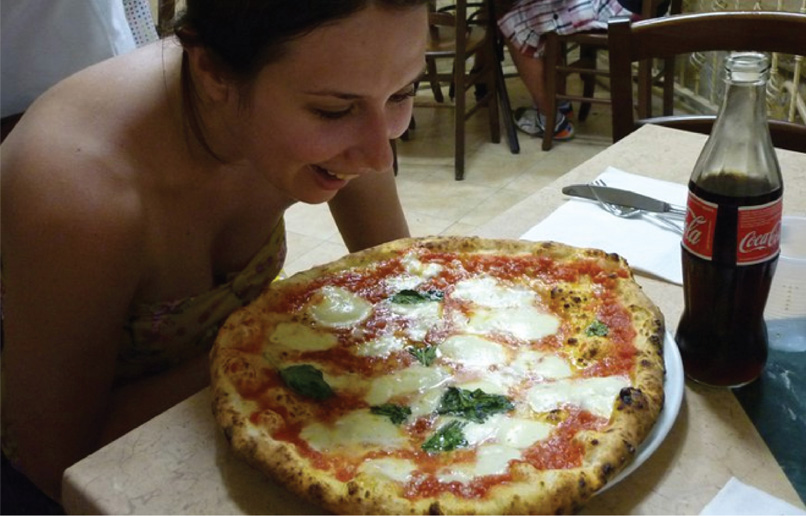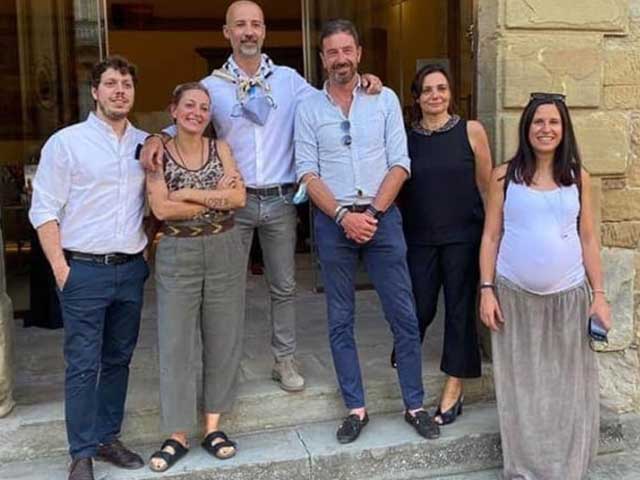
Ogni persona che legge questo blog ha una storia davvero unica e fantastica. Siamo tutti insieme appassionati della lingua e ognuno di noi ha una ragione interessante per impararla. Recentemente avevo l’occasione di conoscere meglio Madeline Pollard Hyde, una lettrice del blog che abita a Montreal in Canada. Madeline è molto simpatica e anche se avesse studiato il francese all’università ora ha un bel motivo per imparare e migliorare il suo italiano. Ecco la sua storia: come una ragazza può mantenere in vita due lingue in una città dove la linguistica a volte può essere una sfida!
Every person who reads this blog has a unique and fascinating story to tell. We are all passionate about the language and each one of us has an interesting reason for wanting to learn the language. Recently I had the chance to get to know Madeline Pollard Hyde, a reader from Montreal Canada. Madeline is molto simpatica and despite having studied French during college now has a great reason for learning and improving her Italian language skills. Here is here story: how a girl can keep two languages alive in a city where languages can be quite a challenge!
Dalla pizza alla poutine: Tentativo di non dimenticare una lingua riscoprendone un’altra
From Pizza to Poutine: An Attempt to Not Forget One Language While Rediscovering Another
Ho avuto sempre l’intenzione di andare a vivere in Francia dopo la mia laurea in lingua francese. Aveva senso. Ahimè! Nel mio penultimo anno di università, ho incontrato un ragazzo italiano durante uno scambio interculturale in Belgio. Come credo abbiate già immaginato, me ne sono innamorata e abbiamo passato tutto il tempo che potevamo insieme prima di dover ritornare a Vancouver, da sola, per otto mesi per finire i miei studi. Com’è crudele la vita! Alla fine, ce l’abbiamo fatta ma il mio progetto per la vita dopo l’università è completamente cambiato. Tre giorni dopo il mio ultimo esame all’università mi sono trovata catapultata su un aereo per andare a vivere a Napoli che è per alcuni la città più intensa, più colorata e, probabilmente, meno francese in Italia. Ho avuto uno splendido soggiorno di 9 mesi li e ho assorbito tutto quello che potevo della cultura, della gente e della lingua che non avrei mai immaginato di imparare. (Potete leggere sulle mie avventure in Italia sul mio blog, scritto nel 2011 in inglese: http://languagelovelife.blogspot.ca/)
I had always thought I would go live in France after completing my Bachelor’s Degree in French. It only made sense. Alas, during my penultimate year of university, I met an Italian during a university exchange in Belgium. As it so happens, we fell in love and spent all of our time together during the exchange before I had to return to Vancouver, alone, to finish my degree during the subsequent eight months. Life can be so cruel! In the end, our relationship survived the distance, and during that time my idea of post-university life completely changed. Three days after my last exam, I found myself en route to Naples, which is often considered the most intense, most colourful, and probably least French city in Italy. I was in Naples for nine months, where I absorbed everything that I possibly could of the culture, the people and the language that only a year earlier, I had not even imagined learning. (You can read about my adventures in Italy in my blog, written in English in 2011: http://languagelovelife.blogspot.ca/ )
Alla fine del 2011 (e del mio permesso di vacanze lavoro in Italia) ci siamo transferiti in una città dove si parla (ufficialmente) in francese: Montréal, Canada. Giovanni, il mio ragazzo, ha trovato un posto per fare un dottorato mentre io, ho trovato un modo per non buttare via gli anni di lavoro e amore per la lingua francese.
At the end of 2011, and my Italian working holiday visa, we moved to an officially French-speaking city, Montréal, in Canada. Giovanni, my boyfriend, was accepted as a PhD candidate while I found a way to put to use the years of hard work and love I devoted to the French language.
Detto questo, sono partita dall’Italia piena di ansia linguistica. Prima di tutto, avevo tanta paura di perdere il mio livello in italiano, il quale era finalmente abbastanza alto quando sono partita. Secondo, avevo molte opportunità di parlare in italiano durante i nove mesi precedenti. Infatti, eccetto qualche soggiorno linguistico in Francia, Belgio e Quebec, non ho avuto molte occasioni di parlare così tanto in francese nella mia vita. Certo, ho letto Balzac, ho scritto su Voltaire e ho ascoltato i professori quando mi hanno parlato. Ma il pensiero di attaccare discorso con qualcuno in francese mi faceva sentire arrugginita, ed anche debole. Adesso, sto affrontando un problema che non avevo mai avuto prima – l’italiano ha preso il posto del francese nella mia testa come seconda lingua. Quindi sto reconciliando questi due problemi: non perdere l’italiano e recuperare il francese. Ma questo non è tutto, in realtà vorrei sempre continuare a migliorare nelle due lingue. Non vorrei fossilizzarmi.
Unfortunately, I left Italy full of linguistic anxiety. First, I was very scared to lose my level in Italian, which had finally reached a sufficiently advanced level as I was getting ready to leave the country. Second, I had had many opportunities to speak in Italian during the previous nine months. In fact, except for a few linguistic experiences in France, Belgium and Quebec, I had never had such an opportunity to speak in French as I had in Italian. Of course, I read my Balzac, wrote about Voltaire and diligently listened to my professors in class. But for me to actually have a discussion with someone in French, I felt rusty. Weak, even. I am facing a problem that I have never had before – Italian has taken the place of French in my brain as my “second” language. So, I am reconciling these two problems of not losing my Italian while reviving my French. Not only that, but I would like to always be improving in both languages. Nothing is worse than stagnation.
Come se non bastasse, Montréal è cosi` complessa come città nel senso linguistico. Le lingue francese e inglese si intrecciano in molti modi. La scelta di parlare l’una o l’altra ha sempre un significato. Nonostante Montréal fosse francese, si potrebbe, troppo facilmente, non parlare neanche una parola di quella lingua perche l’inglese ha una presenza forte. Infatti, l’inglese è cosi` presente che è utilizzato come una cortesia nella vita quotidiana (nei bar, nei negozi, ect) di parlare con la gente nella sua madre lingua. Per esempio, quando sono in un ristorante, il 100% delle volte parlo in francese con la cameriera per approfittare dell’ambiente linguistico, ma il 60% di queste, lei cambia in inglese, perche sente il mio accento anglofono. Non so se questo succede al contrario per i francesi, ma immagino di no. (Probabilmente perche i francofoni a Montréal sono competenti in inglese, e perche la lingua inglese e omnipresente). Il nome di questo fenomeno, che esiste anche per i turisti che vanno in vacanza con la speranza di parlare con i locali nella loro lingua, è “La sfortuna di parlare inglese come madre lingua” o come dice la mia amica, “il temuto scambio di lingua.”
As if I didn’t have enough personal linguistic worries, Montréal is an intrinsically complicated city in terms of language. French and English are intertwined in many ways. Choosing to speak one or the other is a loaded decision, whether made consciously or not. Despite Montreal being officially French-speaking, it’s far too easy to not speak even a word of French here because of the English language’s strong presence. English influence is so strong that it is even considered a courtesy in a daily-life situation (in a cafe or a store, for example) for an employee to speak with a patron in the patron’s mother tongue. For example, when I am in a restaurant, in order to fully take advantage of my French-speaking environment, I speak with the wait-staff 100% of the time in French. However, I’d say about 60% of the time, the waiter will respond to me in English, because he can hear my Anglophone accent. I am not sure if this happens in reverse for the Francophones, but something tells me not. (Probably because Francophones in Montreal are generally proficient in English and probably because they aren’t seeking ways to practice the omnipresent English language). This phenomenon, which also exists for Anglophone tourists who go on vacation in the hopes of speaking the local language, is called “The English Speaking Curse” or, as my friend calls it, “The Dreaded Switch.”
Per aggiungere ancora uno strato di complicazione lingustica in più, c’è qualche tendenza molto interessante che ho notato qui, sopratutto tra i giovani e la gente che parla le due lingue perfettamente. Sebbene qualcuno parli le due lingue allo stesso livello, la struttura ed il vocabolario di ciascuna lingua filtrano l’una attraverso l’altra. Per esempio, quando dicono in inglese “I passed the vacuum cleaner” (J’ai passé l’aspirateur), è comprensibile, ma non è corretto. Oppure, c’è una tendenza qui a Montréal di sentire qualcuno parlare francese ma con tutte esclamazioni che sono in inglese: “Il est venu chez moi hier, is he crazy!?” Nel mio ufficio, dove lavoro con bilingui, le conversazioni a pranzo sono metà e metà in inglese e in francese. Cambiamo la lingua ogni paio di frasi, o rancontiamo una storia in una lingua e poi abbiamo una discussione dopo nell’altra. È affascinate.
To add even more layers of linguistic complication, there are some really interesting trends I’ve noticed here, especially with young people and people who speak both languages more or less perfectly. I’ve noticed that if someone speaks both languages at an equal level, the structure and vocabulary of each language seeps its way into the other. For example, saying in English, “I passed the vacuum cleaner.” (J’ai passé l’aspirateur.) It’s understandable, but not correct. As well, there is a tendency here in Montreal to hear someone speaking in French, but with all the exclamations in English: “Il est venu chez moi hier, is he crazy!?” In my office, where I work with bilinguals, the conversations at lunch are half in English and half in French. We change the language every few sentences, or someone tells a story in one language and the discussion about the story afterwards is in the other. It’s fascinating.
Alla fine, la lingua è stata e sarà sempre argomento di dibattito in Quebec. È una regione circondata dall’inglese e la città di Montréal non è ufficilemente bilingua anche se si sente l’inglese dappertutto. So che è difficile qualche volta esercitarsi in francese in una città come Montréal ma non è impossibile. Meno male che ci sono molte persone che non se ne importano di parlare in un’altra lingua perchè non sono bravi, o sono timidi, oppure sono interessati in altre cose. Non so come succede, ma ci sono anche molte “unilingue” in Montreal. Nello scenario peggiore vi consiglio di andare nella periferia dove nessuno vi risponderà in inglese!
In the end, language will always be a debate in Quebec, which is completed surrounded by English-speaking North America. Even though Montreal is not officially English speaking, you hear it everywhere. I know it is sometimes difficult to practice French in a city like Montreal, but it’s not impossible. Thank goodness that there are a number of people who don’t care at all about speaking another language because they’re not good at it, they’re shy, or they’re simply interested in other things. I don’t know how it happens, but there are many unilinguals in Montreal. Worst case scenario: the suburbs of Montreal (and beyond) are almost exclusively French speaking so, just go there!
Per me, sto trovando qualsiasi modo per esercitarmi nelle due lingue. Ci sono molte opportunità, ma è necessario trovarle perche se no, come ho detto, è facile stare qui senza parlare neanche una parola nell’altra lingua. Parlo in francese sempre in giro per la città, a lavoro con il mio capo, nei corsi di yoga, e con qualche amico. Scrivo in italiano con un’amica di penna e su Facebook e parlo con Giovanni ed i nostri amici italiani. Leggo i blog come quello di Melissa per ispirazione quando mi sento pigra. Perdere o fossilizzarsi in una lingua è un peccato, sopratutto quando nutrire le mie lingue mi stimola e mi rende felice. Come lettrici del favoloso blog di Melissa Muldoon, immagino che proviate questi sentimenti anche voi. Buon lavoro!
For me, I’m finding any way possible to practice my two languages. There are many opportunities to do so, but I must seek them out because otherwise, it is just too easy to speak English. I speak French exclusively when I’m around the town, at work with my boss, in my yoga classes and with some friends. I write in Italian with a pen-pal and on Facebook and I speak it with Giovanni and our Italian friends. I read blogs like Melissa’s for inspiration when I’m feeling lazy! To lose a language or to let it stagnate is a real shame, especially when nurturing my languages keeps me stimulated and happy. As readers of Melissa Muldoon’s fabulous blog, I assume you share some of these sentiments. Happy studies!
Grazie a Giovanni per aver corretto questo blog – non sono così brava senza di lui!

Complimenti Madeline! Sembra che abbia imparato entrambe le lingue molto bene! Per giocare con un famoso detto: “puoi avere la torta e puoi anche mangiarla” ma nel tuo caso “puoi avere la pizza e la poutine e mangiare tutti e due!“
Great job Madeline! It seems to me that you have learned both languages very well! To play with a familiar saying: “you have your cake and you can eat it too” or in your case: “you can have your pizza AND your poutine and eat them both!”












Eh, è incredibile….non vedo una VERA pizza napoletana da anni…la tua foto mi ha fatto venire in mente bei ricordi che andrebbero vissuti più spesso. Devo assolutamente tornare a napoli a spararmi una margherita come si deve!